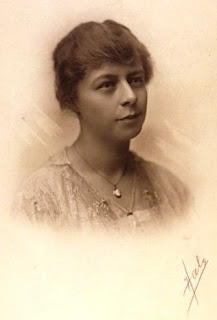Isabel Gladwin Barton: Wife, Helpmeet, and Collaborator

According to publicly available records and genealogy databases, Isabel Gladwin Newton was born on July 21, 1891, in Geneva, New York, to Mary Risley Gladwin, age 24, and Frank Ellsworth Newton, age 28. Isabel Gladwin Newton met George Barton when she was twenty five years old and working as a bookeeper in a preserving and canning plant. She responded to his contact and offer for work; she reported being particularly motivated by the salary of $15 per week, which was more than her $11 weekly salary at the plant. She began working for him on August 1, 1916. (Barton, 1968). She reported being "drawn to him from the very first" and immediately began acting as his secretary and helping him with the publication of several articles and books. She also provided significant material support to Barton in helping to manage his correspondence and organize materials for the First Consolation House Conference and founding of the National Society for the Promotion of Occupation...

